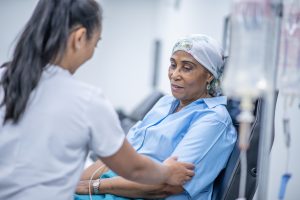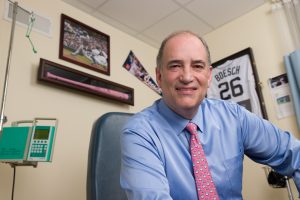Iuliana Shapira, MD, RCCA’s chief medical officer, said, “Overcoming long-standing disparities in cancer care will require a concerted effort from all involved — clinicians and researchers, policy makers and payers, and, of course, patients, who can make a huge difference by being informed and proactive advocates for themselves and their health. The hopeful news with regard to lung cancer is that there are four significant steps people can take to reduce their risk for developing the disease and to increase the likelihood of early diagnosis and effective treatment.”
Those steps, according to Dr. Fitzgerald, Dr. Shapira, and their RCCA colleagues are:
- Avoiding, or stopping, smoking. “The latest data from the Centers for Disease Control and Prevention (CDC) indicate that 11.7% of Black, non-Hispanic American adults smoke cigarettes. This rate is the third-highest among racial and ethnic groups after other non-Hispanic American adults (14.9%) and Whites (12.9%),”4 said Chitra Kumar, MD, a board-certified medical oncologist who practices with RCCA in Edison, N.J. “Cigarette smoking is linked to 80% to 90% of lung cancer deaths,5 which makes avoiding smoking — or stopping smoking if you have begun — an important way to reduce your risk. Smoking cessation can be challenging, but there are several effective approaches available, and even if you have not had success with prior attempts, there are plenty of good reasons and ways to try again.”
- Being screened for lung cancer. “Early diagnosis can have a major impact on survival in lung cancer, and the United States Preventive Services Task Force (USPSTF) recommends annual screening with low-dose computed tomography (LDCT) in adults 50 to 80 years old who have a 20-pack a year smoking history and currently smoke or who have quit smoking in the past 15 years,”6 said Rachel Levenbach, MD, a board-certified medical oncologist and hematologist who practices with RCCA in Moorestown, N.J. A “pack year” is having smoked a pack of cigarettes daily for one year or two packs daily for six months.
“Several studies, including one published in 2020 that involved 675 patients in the Philadelphia area, have shown that Black patients referred to a lung cancer screening program have lower rates of screening and longer time to follow-up compared with white people,” Dr. Levenbach said. “While we need to identify and address health system-related issues that contribute to this disparity, it also is important for individuals who meet the screening requirements to be proactive in protecting their health. Low-dose computed tomography is painless, non-invasive, and performed relatively quickly. Government insurers and most commercial plans cover this screening for people who meet the USPSTF criteria, although it always is important to confirm beforehand that your plan will cover the imaging study. If you or someone you love is eligible for screening, please don’t delay in taking this potentially life-saving step.”
- Having symptoms evaluated promptly. “Many of the initial signs of lung cancer, such as a persistent cough or hoarseness, also are common symptoms of other, less-concerning conditions. For this reason, and sometimes also because of a lurking fear that the symptom may represent something serious, many people defer seeking medical attention, telling themselves, for instance, that a lingering cough likely is caused by allergies,” said Joseph McLaughlin, MD. The board-certified medical oncologist and hematologist, who practices with RCCA in Manchester, CT, added, “Most people who have a cough, hoarseness, fatigue, or one of the other symptoms of lung cancer will not have cancer, but a minority of those people will have a significant medical condition, be it lung cancer or something else that requires prompt attention. Having one or more of these symptoms is not cause to panic, but it is cause to talk with your doctor rather than ignoring what is going on. If it turns out to be nothing serious, you’ll have reassurance and peace of mind — and your physician may be able to prescribe a medication or recommend lifestyle changes to relieve the symptom. If it is lung cancer, early identification and intervention can make a huge difference in outcomes.”
- Participating in a clinical trial. RCCA physicians note that while immunotherapies have played a leading role in extending survival in non-small cell lung cancer, Black people were significantly under-represented in clinical trials of these treatments, often making up less than 4% of the study population.7 They added that this lack of adequate representation in clinical trials deprives patients and their physicians of the large-scale data that can be important when selecting a treatment. It also means that many Black people are not getting access to promising investigational therapies. RCCA’s physicians urge all people being treated for lung cancer to talk with their oncologist about clinical trials. It is important, they note, for patients to understand the full range of available options, as well as the informed-consent process and other safeguards in place to respect patients’ rights.
Dr. Fitzgerald notes, “We are making progress in reducing the racial disparities that mark cancer care, although there is much more to be done to eliminate these inequities. Research has shown that system-level interventions can play an important role in this effort,8 as can the awareness and assertiveness of individual clinicians. At RCCA, we are committed to partnering with our patients and others to ensure that all people facing cancer are able to receive the therapies and other care that they deserve and need. When it comes to the leading cause of cancer deaths for all Americans and for Black Americans, we urge people to take these four important steps to reduce not only disparities in care but also their own risk of developing and dying from lung cancer.”
*******
Drs. Fitzgerald, Shapira, Kumar, Levenbach and McLaughlin are among the 90-plus cancer specialists who treat patients at 22 RCCA care centers located throughout New Jersey, Connecticut, Maryland and the Washington, DC, area. RCCA oncologists and hematologists see more than 26,000 new patients each year and provide care to more than 225,000 established patients, collaborating closely with their patients’ other physicians. They offer patients the latest in cutting-edge treatments, including immunotherapies and targeted therapy, as well as access to a wide range of clinical trials. In addition to serving patients who have solid tumors, blood-based cancers and benign blood disorders such as anemia, RCCA care centers also provide infusion services to people with a number of non-oncologic conditions — including multiple sclerosis, Crohn’s disease, asthma and rheumatoid arthritis — who take intravenously- administered medications. To learn more about RCCA, call 1-844-346-7222 or visit RCCA.com.
References:
- American Lung Association. Racial and ethnic disparities. https://www.lung.org/research/state-of-lung-cancer/racial-and-ethnic-disparities. Accessed September 22, 2023.
- American Cancer Society. Key statistics for lung cancer. https://www.cancer.org/cancer/types/lung-cancer/about/key-statistics.html. Accessed September 22, 2023.
- American Cancer Society: Cancer Facts & Figures for African-American/Black People 2022-2024. https://www.cancer.org/content/dam/cancerorg/research/cancer-facts-and-statistics/cancer-facts-and-figures-for-african-americans/2022-2024-cff-aa.pdf. Accessed September 22, 2023.
- US Centers for Disease Control and Prevention. Current Cigarette Smoking Among U.S. Adults Aged 18 Years and Older.
https://www.cdc.gov/tobacco/campaign/tips/resources/data/cigarette-smoking-in-united-states.html. Accessed September 22, 2023.
- Lake M, Shusted CS, Joun H-S, et al. Black patients referred to a lung cancer screening program experience lower rates of screening and longer time to follow up. BMC Cancer. 2020;20:561. Doi.org/10.1186s/12885-020-06923-0.
- United States Preventive Services Task Force. Final Recommendation Statement. Lung Cancer: Screening. March 9, 2021.
https://www.uspreventiveservicestaskforce.org/uspstf/recommendation/lung-cancer-screening. Accessed September 22, 2023.
- Nazha B, Mishra M, Pentz R, Owonikoko TK. Enrollment of racial minorities in clinical trials: Old problem assumes new urgency in the age of immunotherapy. 2019 ASCO Educational Book. https://ascopubs.org/doi/full/10.1200/EDBK_100021. Accessed September 22, 2023.
- Cykert S, Eng E, Walker P, et al. A system-based intervention to reduce Black-White disparities in the treatment of early stage lung cancer. A pragmatic trial at five cancer centers. Cancer Med. 2019;8:1095-1102.
By the Numbers: Black People and Lung Cancer
13,200 — Estimated number of new cases of lung cancer in Black men in 2022
12,490 — Estimated number of new cases of lung cancer in Black women in 2022
7,890 — Estimated number of lung cancer deaths in Black men in 2022
6,270 — Estimated number of lung cancer deaths in Black women in 2022
1 in 16 – A Black man’s lifetime risk of developing invasive lung cancer
1 in 21 – A Black woman’s lifetime risk of developing invasive lung cancer
1 in 21 – A Black man’s risk of dying from lung cancer
1 in 29 – A Black woman’s risk of dying from lung cancer
Source: American Cancer Society: Cancer Facts & Figures for African-American/Black People 2022-2024








